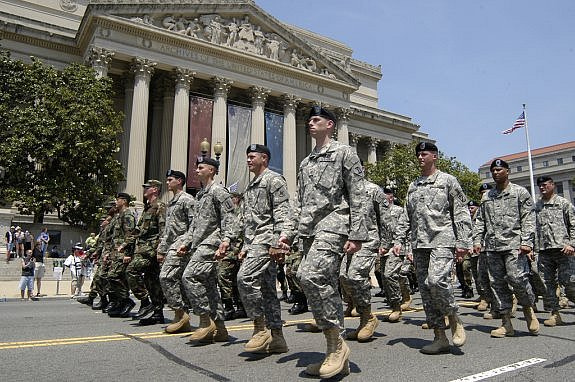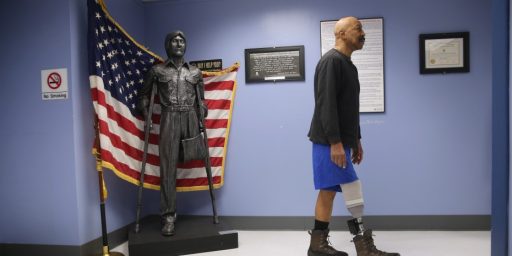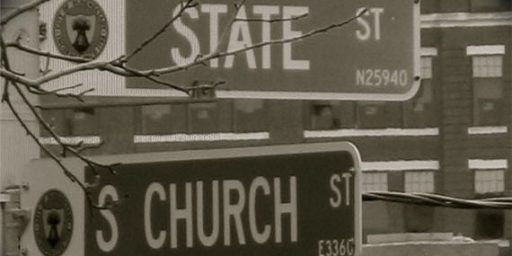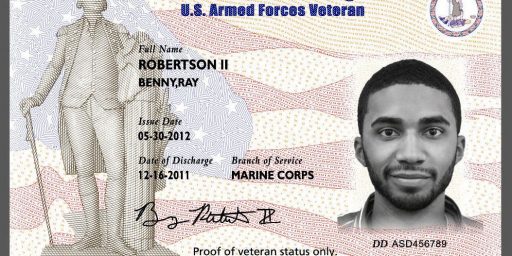Reflections On Memorial Day And “National Unity”
In today’s Washington Post, E.J. Dionne wonders why Memorial Day has become a less important holiday over the years:
Why is it that every Memorial Day, we note that a holiday set aside for honoring our war dead has become instead an occasion for beach-going, barbecues and baseball?
The problem arises because war-fighting has become less a common endeavor than a specialty engaged in by a relatively small subset of our population. True, some people slipped out of their obligations in the past, and military service was largely, though never exclusively, the preserve of men. The steady growth of opportunities for women in the armed forces is a positive development. I say this proudly as someone whose sister is a veteran of the Navy Judge Advocate General’s Corps, as is her husband.
Can we ever return to a time when we pay proper homage to the service of our warriors, living and dead? Closing the divide that exists between military life and the rest of our society is the first step on that path. Achieving that end is the single best reason for ending the ban on gays in the military. This is not a special-interest demand. It is a powerful way of declaring that in a democracy, service should be seen as a task open to all patriots.
Our major wars — particularly the Civil War, which gave rise to Memorial Day, and World War II — were in some sense mass democratic experiences. They touched the entire country. The same cannot be said of our more recent conflicts.
Because it has been 65 years since we’ve seen anything like a mass mobilization, regular contact with our military is largely confined to the places where our men and women in uniform live. And, according to a 2007 Defense Department report, more than half of our home-based military personnel — 54.5 percent of them — are stationed in only six states: California, Virginia, Texas, North Carolina, Georgia and Florida. Twelve states account for three-quarters of our service members. “Out of sight, out of mind” is a terrible principle when it comes to honoring those who protect us. But is there any doubt that it applies?
Probably not, but is that such a bad thing ?
World War Two and the Civil War certainly did put the general public more closely in touch with the military but they also resulted in much death and destruction of property. By the same token, we saw a massive rise in patriotism after the September 11th attacks. Surely Dionne isn’t suggesting that what we need to bring us together is another massive war or a terrorist attack.
Like many people who put on a self-righteous tone on days like this, Dionne seems upset by the fact that most Americans mark Memorial Day by going to the beach, shopping or grilling hamburgers instead of something more appropriate to the day. This is just an idiotic sentiment. What, exactly, is it that Dionne would have Americans do on Memorial Day instead ? Going to the beach doesn’t mean you’re disrespecting the war dead, it means that you are fortunate enough to live in a country where death in war is thankfully rare.
Dionne’s real concern, though, isn’t for appropriate Memorial Day remembrances, but for the standard canard about “national unity”:
The isolation of our military is part of a larger Balkanization of our nation into political and social classes that have little empathy for each other. Contrast this with what Perrett writes about our response to World War II: “A wildly heterogeneous nation was more completely united in purpose and spirit than at any time in its history.”
It’s hard to imagine we’ll be that united anytime soon. But history tells us that the honor we accord our veterans is closely linked to the respect and solidarity we express toward each other as fellow citizens of a democracy. Perhaps our veterans can teach us how to do this again.
Again I ask, is Dionne really trying to suggest that the bloodiest war in modern history was a good thing because it “united” the nation ? Wars are often necessary things but there are rarely good things, regardless of the alleged side benefits of “unity” and “national purpose.”
Are we a less unified county than we were during the years between December 1941 and August 1945 ? Probably yes, but given the costs of that type of unity, I fail to see how that’s a bad thing.







Why is Memorial Day a less important holiday? Lots of reasons. Decoration Day’s and Armistice Day’s transmogrification from commemorations of pivotal events in our shared history to recognition of present devotion by a declining proportion of our society’s members may give them more relevance to our short-memoried citizenry but they also impoverish our sense of community.
When you recognize his importance to the Republic, George Washington’s Birthday is a holiday worthy of the name. President’s Day? Just another Monday holiday.
Additionally, as more of our opinion makers become ashamed of our country’s military history would we actually expect them to celebrate civic holidays that honor that history and present?